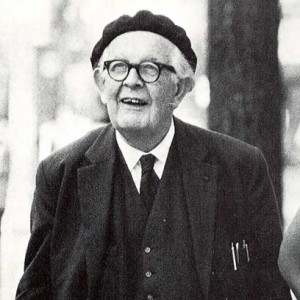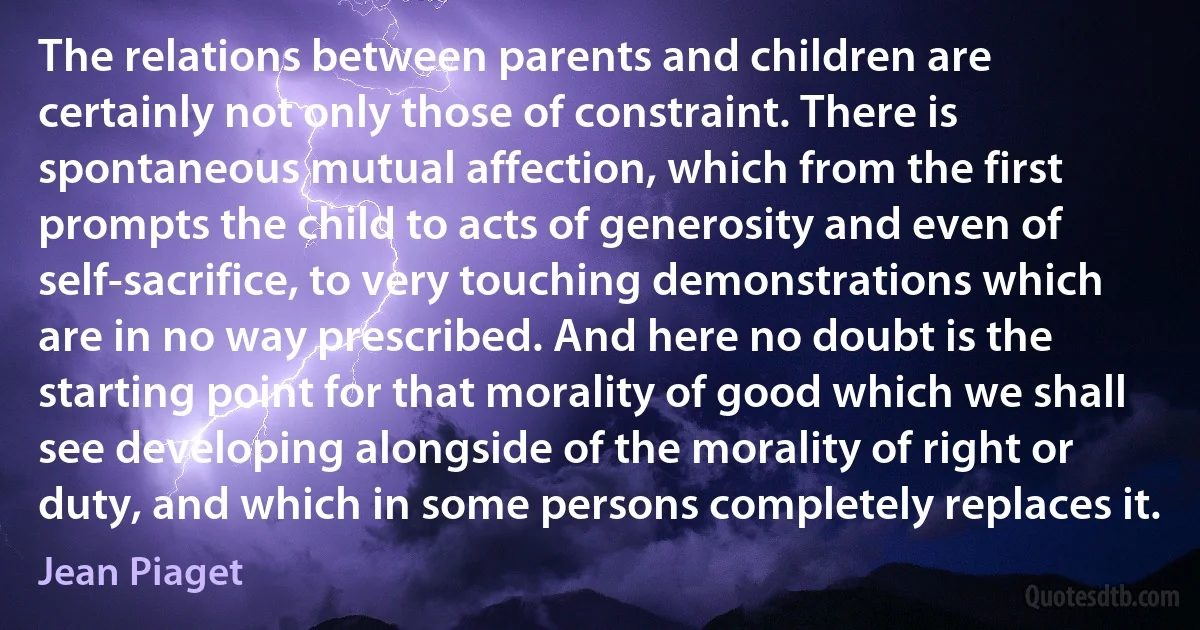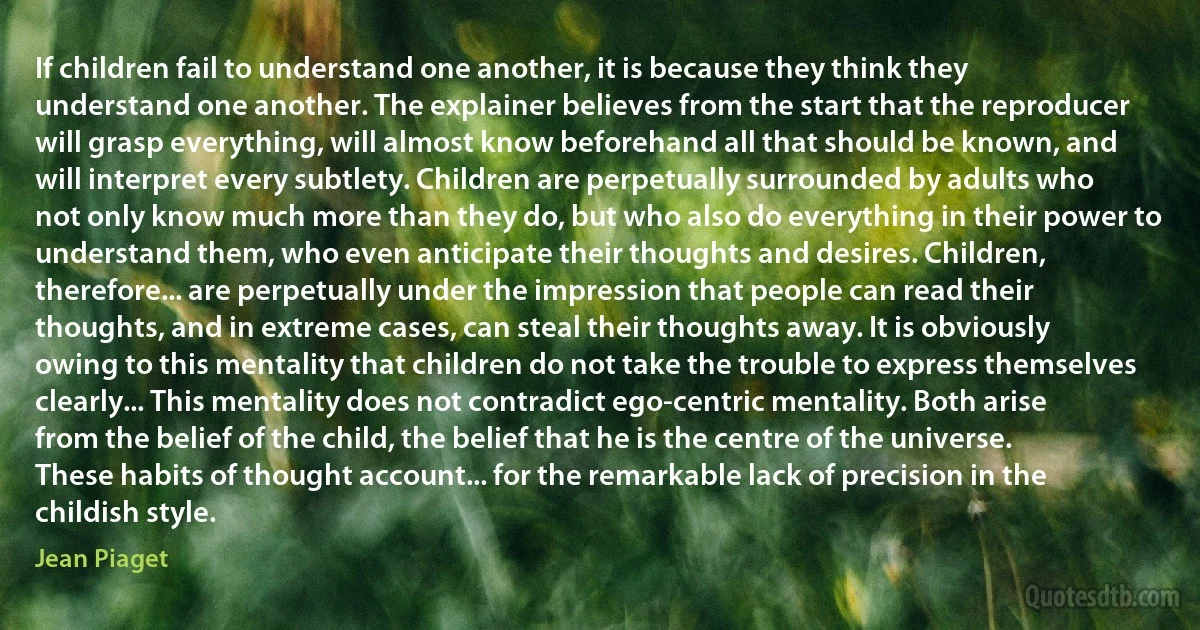Jean Piaget quotes - page 5
Jean Piaget was a Swiss psychologist renowned for his pioneering work in child development. His theory of cognitive development profoundly influenced education and our understanding of how children learn. He remains one of the most influential figures in developmental psychology. Here are 125 of his quotes:
There is little mysticism without an element of transcendence, and conversely, there is no transcendence without a certain degree of egocentrism. It may be that the genesis of these experiences is to be sought in the unique situation of the very young child in relation to adults. The theory of the filial origin of the religious sense seems to us singularly convincing in this connection.

Jean Piaget
The discussion of the game of marbles seems to have led us into rather deep waters. But in the eyes of children the history of the game of marbles has quite as much importance as the history of religion or of forms of government. It Is a history, moreover, that is magnificently spontaneous; and it was therefore perhaps not entirely useless to seek to throw light on the child's judgment of moral value by a preliminary study of the social behaviour of children amongst themselves.

Jean Piaget
In this way things, external objects, are assimilated to more or less ordered motor schemas, and in this continuous assimilation of objects the child's own activity is the starting point of play. Not only this, but when to pure movement are added language and imagination, the assimilation is strengthened, and wherever the mind feels no actual need for accommodating itself to reality, its natural tendency will be to distort the objects that surround it in accordance with its desires or its fantasy, in short to use them for its satisfaction. Such is the intellectual egocentrism that characterizes the earliest form of child thought.

Jean Piaget
It is as his own mind comes into contact with others that truth will begin to acquire value in the child's eyes and will consequently become a moral demand that can be made upon him. As long as the child remains egocentric, truth as such will fail to interest him and he will see no harm in transposing facts in accordance with his desires.

Jean Piaget
In certain circumstances where he experiments in new types of conduct by cooperating with his equals, the child is already an adult. There is an adult in every child and a child in every adult. ... There exist in the child certain attitudes and beliefs which intellectual development will more and more tend to eliminate: there are others which will acquire more and more importance. The later are not derived from the former but are partly antagonistic to them.

Jean Piaget
Mixture of assimilation to earlier schemas and adaptation to the actual conditions of the situation is what defines motor intelligence. But and this is where rules come into existence as soon as a balance is established between adaptation and assimilation, the course of conduct adopted becomes crystallized and ritualized. New schemas are even established which the child looks for and retains with care, as though they were obligatory or charged with efficacy.

Jean Piaget
The motor rule. In its beginnings the motor rule merges into habit. During the first few months of an infant's life, its manner of taking the breast, of laying its head on the pillow, etc., becomes crystallized into imperative habits. This is why education must begin in the cradle. To accustom the infant to get out of its own difficulties or to calm it by rocking it may be to lay the foundations of a good or of a bad disposition.
But not every habit will give rise to the knowledge of a rule. The habit must first be frustrated, and the ensuing conflict must lead to an active search for the habitual. Above all, the particular succession must be perceived as regular, i.e. there must be judgment or consciousness of regularity (Regelbewusstseiri). The motor rule is therefore the result of a feeling of repetition which arises out of the ritualization of schemas of motor adaptation.

Jean Piaget
Egocentrism in so far as it means confusion of the ego and the external world, and egocentrism in so far as it means lack of cooperation, constitute one and the same phenomenon. So long as the child does not dissociate his ego from the suggestions coming from the physical and from the social world, he cannot cooperate, for in order to cooperate one must be conscious of one's ego and situate it in relation to thought in general. And in order to become conscious of one's ego, it is necessary to liberate oneself from the thought and will of others. The coercion exercised by the adult or the older child is therefore inseparable from the unconscious egocentrism of the very young child.

Jean Piaget
To perceive is to construct intellectually, and if the child draws things as he conceives them, it is certainly because he cannot perceive them without conceiving them. But to give up gradually the spurious absolutes situated away and apart from the context of relations that has been built up during experience itself is the work of a superior kind of rationality. When the child comes to draw things as he sees them, it will be precisely because he has given up taking isolated objects in and for themselves and has begun to construct real systems of relations which take account of the true perspective in which things are connected.

Jean Piaget
There are in existence two distinct ideas of justice. We say that an award is unjust when it penalizes the innocent, rewards the guilty, or when, in general, it fails to be meted out in exact proportion to the merit or guilt in question. On the other hand, we say that a division is unjust when it favors some at the expense of others. In this second adaptation of the term, the idea of justice implies only the idea of equality. In the first acceptation of the term, the notion of justice is inseparable from that of the reward and punishment, and is defined by the correlation between acts and their retribution.

Jean Piaget
Jean Piaget
 Occupation: Swiss Psychologist
Occupation: Swiss Psychologist
Born: August 9, 1896
Died: September 16, 1980
Quotes count: 125
Wikipedia: Jean Piaget










